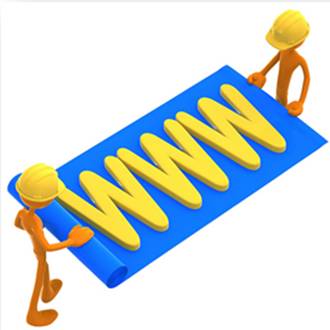The Internet and the World Wide Web (www).
 The terms Internet (or 'Net') and World Wide Web (or 'Web') are often used interchangeably, but in fact are two separate, although related, things.
The terms Internet (or 'Net') and World Wide Web (or 'Web') are often used interchangeably, but in fact are two separate, although related, things.
The term 'Internet' is a shortened version of an 'interconnection of computer networks', a massive network of networks. This is a global structure which combines and links millions of personal, business, and governmental computers, all connected like roads and highways. Any one computer can communicate with any other computer as long as they are both connected to the Internet. The information travelling over the Internet uses a variety of languages known as protocols.
The Web, however, is just one part, or subset, of the Internet. The Web is a way of accessing information over the medium of the Internet using free software called web browsers (which we know well by their brand names - Internet Explorer, Firefox, Opera etc). The Web uses the HTTP protocol to transmit data, which is only one of several languages spoken over the Internet. Browsers allow users (you and me) to access Web pages, or documents, that may contain a range of graphics, sounds, text and video. Web pages themselves are linked to each other via hyperlinks and a Website is a collection of related web pages. All publicly accessible websites collectively constitute the World Wide Web. It was estimated that in 2009, there were approximately 25 billion web pages and 110 million websites, although the exact figures are difficult to verify.
![]()
"The social value of the Web is that it enables human communication, commerce, and opportunities to share knowledge [and] to make these benefits available to all people, whatever their hardware, software, network infrastructure, native language, culture, geographical location, or physical or mental ability."
Sir Tim Berners-Lee, inventor of the World Wide Web
Comparative data on the number of users in different continents and countries can be found here on the Internet World Stats site.
The Internet
The Internet (not the Web) is also used for other purposes, primarily for e-mail. What is important about the Internet - which makes it unique in a commercial sense - is that no one owns it. It is true that governments and organisations can control parts of it, or influence its development, but no one body can easily prevent free access or the dissemination of information and transfer of data. This makes the Internet a potentially liberating and democratising tool. Small firms can use the Internet as freely as large firms. This provides an opportunity for small firms and a potential threat to the larger, more established businesses.
However, access to computers and to the Internet varies considerably between countries and regions, and poor or limited access can be both a weakness and a potential threat, if competitors in other regions are able to use the Internet and the Web more effectively to improve communications and to promote, sell and distribute goods and services. In addition, less democratic states may try to restrict the information available to users within that country.

'Google Shuts China Site in Dispute Over Censorship'
In 2010 Google shut its China site in a dispute over the censorship of its content by the Chinese government. In the short run, Google's action will not have a huge impact as the Chinese market represents a relatively small 2% of its annual $24bn revenue, but it risks losing the huge future revenues as China's Internet market continues to expand.
The void left by Google has been filled effectively by the Chinese search engine Baidu, which is the leading search engine in China and willing to cooperate with government censorship requirements. This illustrates the fact that multinational providers may have problems satisfying local tastes and complying with national laws and regulations.
You can read about Google's decision in the articles:
Commercial firms do not like free access and unregulated information, so try to incentivise individuals to join communities and networks that can be controlled. Meanwhile, more and more of the interesting stuff on the Web is hidden behind a login and password. Examples are social networking sites such as Facebook, MySpace and Flikr. These have millions of users, but present two significant problems. Firstly, information on one site is not usable in the others and secondly, these sites do not allow users much control over how their personal information is disseminated, which results in potential privacy problems.
The whole framework of the Web (and Web marketing) is based around the idea that everything is in a compatible format. Any browser, any computer, any connection, you see pretty much the same thing. A 2010 Business week article suggests a label for the increasing commercialisation of the net - calling it the rise of the "Splinternet". This phrase originated from Josh Bernoff, is a reference to a situation where the common Web browser experience of the past 15 years is shattered into systems of incompatible content formats. Now with iPhones, Androids, Kindles, Tablets, and TVs connecting to the Web, that's not true. Your site may not work correctly on these devices. For example, Apps that work on the iPhone don't work on Google's Android systems. Consumers may have to adapt to a world where gadgets are the new marketing medium.
